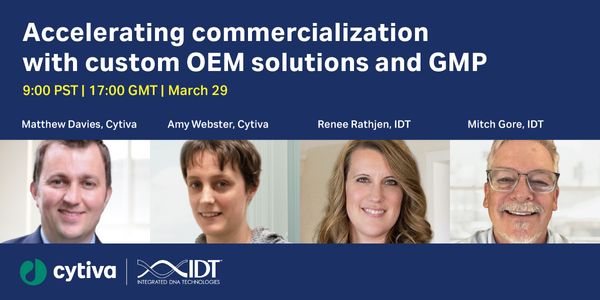Healthcare IT
Healthcare IT (healthcare information technology) is the area of IT involving the design, development, creation, use and maintenance of information systems for the healthcare industry. Automated and interoperable healthcare information systems will continue to improve medical care and public health, lower costs, increase efficiency, reduce errors and improve patient satisfaction, while also optimizing reimbursement for ambulatory and inpatient healthcare providers.
-
OCT 04, 2022 | 9:00 AMDate: October 04, 2022 Time: 9:00am (PDT), 12:00pm (EDT), 6:00pm (CEST) The Miro Canvas is a new platform which enables full walkaway automation of complex next generation sequencing (NGS) s...Pathogen detection and surveillance have become a high priority in both healthcare and environmental settings for the safety of patients and the general public. The COVID-19 pandemic highlig...Speaker: Dylan Barbera
AUG 24, 2022 | 7:00 AM
Date: August 24, 2022 Time: 7:00am (PDT), 10:00pm (EDT), 4:00pm (CEST) Light field microscopy was first introduced in 2006, and allows users to capture the 4D light field within the microsco...
Speaker:
Matthew Kose-Dunn
, Phil Allen
, Liang Gao
, Shu Jia
Sponsored By: Teledyne Photometrics
AUG 18, 2022 | 10:00 AM
Date: August 18, 2022 Time: 10:00am (PDT), 1:00pm (EDT), 7:00pm (CEST) Learning Objectives Discuss evolving etiologies for Community Acquired Pneumonia (CAP) Review the role of biomarkers in...
AUG 16, 2022 | 7:00 AM
Date: August 16, 2022 Time: 7:00am (PDT), 10:00am (EDT), 4:00pm (CEST) In this session, researchers, clinicians, and program implementers from four countries will address the disruption in co...
Speaker:
Carlos Brites, MD, PhD
, Mandisa Dukashe, MPH, PhD(c)
, Olabanjo Okunlola Ogunsola, MBCHB, MPH, FWACP
, Dr. Cissy Kityo Mutuluuza, MBChB, M.Sc, PhD
, Obiageli Okafor, MD, DrPH, MPH, Moderator
Sponsored By: Thermo Fisher Scientific
JUL 21, 2022 | 11:00 AM
Date: July 21, 2022 Time: 11:00am (PDT), 2:00pm (EDT), 8:00pm (CEST) In light of the recent pandemic, less attention has been given to more common viruses like influenza. Scientists believe...
JUN 30, 2022 | 9:00 AM
Date: June 30, 2022 Time: 9:00am (PDT), 12:00pm (EDT), 6:00pm (CEST) Subclinical acute rejection (SubAR) is a significant risk for kidney transplant recipients, affecting 1 in 4 patients. Ea...
JUN 21, 2022 | 10:00 AM
Date: June 21, 2022 Time: 10:00am (PST), 1:00pm (EST), 7:00pm (CEST) The proteome is perhaps the most dynamic and valuable source of functional biological insight. Here, we introduce a novel...
JUN 21, 2022 | 8:00 AM
Date: June 21, 2022 Time: 8:00am (PDT), 11:00pm (EDT), 5:00pm (CEST) The adoption of digital pathology is a multifaceted project involving many stakeholders across the pathology department....
JUN 21, 2022 | 6:00 AM
Date: June 21, 2022 Time: 6:00am (PDT), 9:00am (EDT), 3:00pm (CEST) The global understanding and practice of medicine is currently undergoing a revolutionary change. This shift to precision...
Speaker:
Zisis Kozlakidis
, David Hanna
, Dr. Yehudit Cohen
, Sowmiya Moorthie
, Shai Carmi
Sponsored By: Thermo Fisher Scientific
MAY 31, 2022 | 11:00 AM
Date: May 31, 2022 Time: 11:00am (PST), 2:00pm (EST), 8:00pm (CEST) In February of this year Minnesota became the first state in the U.S. to screen every newborn for congenital CMV. This was...
MAY 19, 2022 | 6:00 AM
Date: May 19, 2022 Time: 6:00am (PST), 9:00am (EST), 3:00pm (CEST) In the age of evidence-based medicine, evidence-informed decision making is rapidly gaining influence. However, clinical pe...
MAY 05, 2022 | 9:00 AM
Date: May 5, 2022 Time: 9:00am (PDT), 12:00pm (EDT) In a time when there is global urgency around producing and deploying as many COVID-19 vaccines as...
Diagnostics have never been more important or visible on the world stage as they are today in the midst of the COVID-19 global pandemic. Mara will speak about how COVID diagnostics have been...
MAY 03, 2022 | 8:00 AM
Cancer is a disease of the genome, and as such, tools that can analyze the genome are instrumental in understanding the mechanisms that lead to cancer, detecting cancerous cells, and providi...
APR 28, 2022 | 9:00 AM
Date: April 28, 2022 Time: 9:00am (PDT), 12:00pm (EDT), 6:00pm (CET) During previous webinars we have discussed the global impact of antimicrobial resistance (AMR) infections, explored biolo...
Genomics has had rapid implementation over the past decade, with recent growth in application in oncology, mental health, maternal fetal medicine, solid organ transplantation, and more. Much...
Esophageal adenocarcinoma [EAC] is the fastest growing in incidence cancer in the US over the last 25 years, while also having a 5 year survival of less than 20%. Barrett’s Esophagus [...
While early genetic diagnosis can guide critical care management, the turnaround time for whole genome based diagnostic testing is months. Recent programs in neonatal populations have reduce...
Pathogen detection and surveillance have become a high priority in both healthcare and environmental settings for the safety of patients and the general public. The COVID-19 pandemic highlig...
MAR 31, 2022 | 11:00 AM
Date: March 31, 2022 Time: 11:00am (PDT), 2:00pm (EDT), 8:00pm (CET) Formalin-fixed paraffin-embedded (FFPE) tissues are the most widely used clinical sample types in histology and molecular...
MAR 30, 2022 | 6:00 AM
Targeted NGS has been instrumental in helping the healthcare community deliver on the promise of precision medicine. The Ion Torrent Genexus Integrated Sequencer has enabled targeted genomic...
Speaker:
Andy Felton, Ph.D.
, Dr. Luca Quagliata, PhD, BCMAS
, Kathy Davy
Sponsored By: Thermo Fisher Scientific
MAR 29, 2022 | 9:00 AM
Date: March 29, 2022 Time: 09:00am (PDT), 12:00pm (EDT), 17:00 (GMT) Advances in molecular and immunodiagnostics are enabling a personalized, high-precision approach to health in many clin...
Speaker:
Matthew Davies
, Amy Webster
, Mitch Gore
, Renee Rathjen
Sponsored By: Pall Medical, now a part of Cytiva,
IDT
To date, the therapeutic use of cannabinoids in chronic pain management remains controversial owing to the limited clinical evidence found in randomized clinical trials (RCTs), the heterogen...























